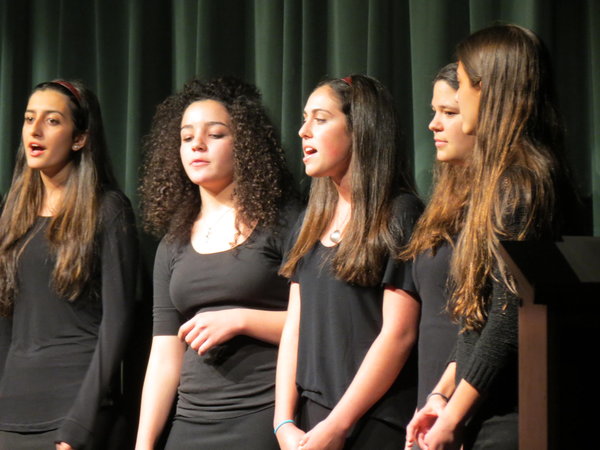A win for the Choirhawks on a night of harmony

HARMONY: Natalie Dahan, second from left, beat-boxed as Shirel Benji, Liat Bainvoll, Talya Joffe and Nicole Soussana sang during the female Choirhawks performance April 30. YULA’s choir, right, was entirely student-led.
June 15, 2014
YULA’s girls-only “Neima: Sing It Forward” competition used song to raise funds for Tomchei Shabbos
By Tamar Willis, Editor-in-Chief
The Choirhawks took home first place at the first-ever “Neima: Sing It Forward” a capella competition on April 30—and they only competed with eight of their 16 members.
The shortage was not due to a conflict with drama practice or an AP class. The eight performers were the female Choirhawks — Neima was a women-only singing competition between Shalhevet, YULA and Bnos Devora, hosted by YULA Girls’ School.
Despite having had just two formal rehearsals and singing with half their usual cohort, the Choirhawks outperformed the other two groups.
According to Barb Heller, one of the competition’s three judges, the Choirhawks won because they sounded almost perfect.
“They were exceptionally well trained,” said Ms. Heller, a music theater veteran who studied at NYU’s Tisch School, after the results were announced. “Their balance was wonderful and they had cohesive, beautiful arrangements. They had close to perfect pitch and it was clear they put the most time into it.”
The competition was held in the YULA Girls School auditorium and raised over $1500 for Tomchei Shabbos by charging $10 for student tickets and $15 for adults. The room was filled with women in skirts and sheitels there to support the three schools and a good cause.
YULA seniors Rachel Brunelle and Yael Nisanoff organized the event to foster a sense of community between the rival schools and to support Tomchei, which organizes weekly food deliveries to needy families.
“A lot of the time we are all divided so it’s nice to come together for the same cause,” Rachel said. “Hopefully next year we’ll expand to even more Jewish schools across the city.”
The Choirhawks’ winning performance consisted of three short songs. Clad head-to-toe in black with red glitter headbands, first they sang “Nachamu,” starting off slow then picking up the tempo and adding a step-clap rhythm. Then they crooned a dramatic “Hashkeveinu.”
They ended with “Lecha Dodi” to the tune of “Story of My Life” by One Direction. Senior Natalie Dahan beat-boxed for a part of the song, which elicited both gasps and applause from the audience.
Mrs. Joelle Keene, the Choirhawks’ director, did not hesitate to sing the girls’ praises.
“I’m so proud of these girls, they learned everything quickly and they still had so much style and personality,” said Mrs. Keene. “There’s just a tremendous amount of talent and dedication in this group, and they all really enjoy it so we have a wonderful time together, which makes it really easy to practice.”
Bnos Dvorah’s choir heads were seniors Eliana Laureano and Racheli Topp and they were led by Mrs. Joanna Burt. YULA’s choir is entirely student-led by Yael Nissanoff and junior Michelle Naim. All three schools had cheering supporters in the audience.
Yael and Michelle opened the evening with a dvar Torah about the Omer, which commemorates the death of Rabbi Akiva’s students in the second century C.E. It is believed that the 24,000 students died because they failed to respect to one another, so Jewish schools creating music together today is a good way to heal that wound, they said.
Listening to live music is prohibited during the Omer, so no instruments were used in the competition. However, Shalhevet Principal Reb Noam Weissman said that he and the heads of the other schools decided, after some discussion, that they would allow singing because it was an opportunity to foster camaraderie between the schools.
“The idea behind the competition was that it was supposed to have a festive feel,” Reb Noam said. “It was an opportunity for Jews from different backgrounds to come together to sing nice Jewish songs and that’s what it was, so ultimately the schools decided that this was appropriate, though some with more hesitance than others.”












